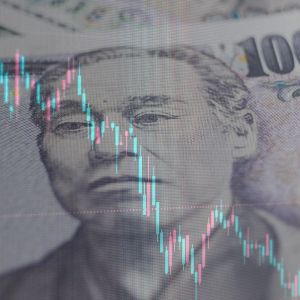Japan’s bond market just fired a warning shot at the global economy. The country’s 40-year government bond yield surged to 3.445% on Monday, the highest it’s been in two decades. This spike followed a wave of instability sparked by Moody’s downgrade of the United States’ credit rating on Friday, which lowered it from Aaa to Aa1 due to rising fiscal deficits and what the agency called “a lack of effective policy action.” The effects of that decision were immediate as Japan’s 10-year bond yield also climbed to 1.47%. Investors inside Japan didn’t get any good news either. Economic figures released the same day showed that Japan’s economy shrank in Q1 of 2025, falling faster than analysts expected and officially posting the country’s first contraction in a year. That contraction came as Japan was already struggling to stabilize its recovery. At the same time, the Bank of Japan is being backed into a corner, as bond yields climb and inflation refuses to calm down. Rising yields pressure Bank of Japan to act Shinichi Uchida, the deputy governor of the Bank of Japan, told Japan’s parliament that the central bank would raise interest rates again if the economy begins to recover from the shock caused by new US tariffs under President Donald Trump’s administration. Uchida also said inflation was still hovering around the BOJ’s 2% target, but warned that the outlook remains unstable. “There is extremely high uncertainty over the outlook for each country’s trade policy and its fallout,” he said, pointing out that a rebound in inflation could drive further rate hikes. He also pointed to rising import costs, especially for food like rice, as a growing burden on Japanese households. “We are mindful that such price rises are having a negative impact on people’s livelihood and consumption,” Uchida told lawmakers. Japan’s debt situation isn’t helping. The country’s debt-to-GDP ratio is over 250%, the highest of any major economy. When yields climb this high, the national debt becomes even harder to manage since the government has to pay more to borrow, and the cost of servicing existing debt keep surging. That’s not just Japan’s problem, it’s a global threat. Japan’s bond market is one of the largest on earth, and any signs of stress there can cause financial tremors around the world. If investors pull out of Japan’s bonds, other markets could get hit with rising borrowing costs. That includes both developed countries and fragile emerging markets that depend on steady capital inflows. On the flip side, if yields keep rising and foreign investors pile into Japanese assets, the yen could strengthen fast. The bond market’s situation is also affecting Japan’s pension funds, which are heavily invested in low-yield bonds. That’s bad news for Japan’s aging population, and it’s worse for consumer spending, which will likely drop if retiree income takes a hit. Meanwhile, Japanese banks holding long-term bonds are seeing their balance sheets deteriorate, which is exactly the kind of shock that would hit international banking hard and destabilize many financial institutions. With Japanese and US yields now rising, investors are already pulling capital out of developing economies, chasing higher returns in safer places. That leaves countries in Asia, Africa, and Latin America even more exposed to currency crashes, loan defaults, and financing gaps. Cryptopolitan Academy: Want to grow your money in 2025? Learn how to do it with DeFi in our upcoming webclass. Save Your Spot















